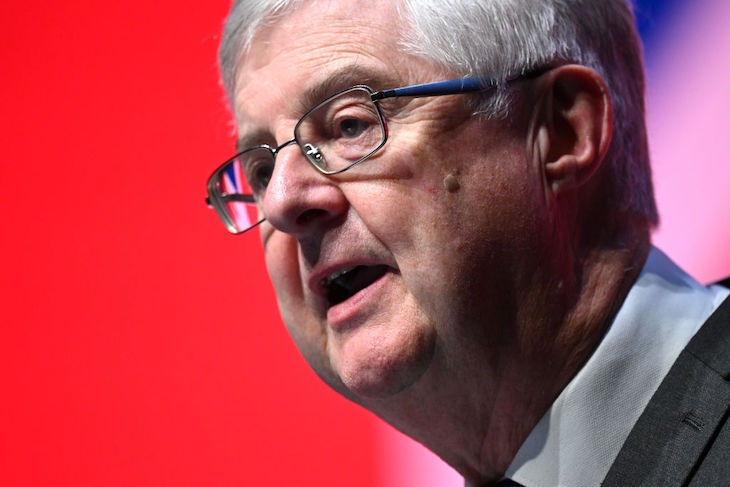The contest to be the next leader of the Welsh Labour Party, and more importantly First Minister of Wales, has been something of a snooze fest. The race kicked off in December, when Mark Drakeford, first minister since 2018, announced that he was stepping down. There are two candidates – Vaughan Gething and Jeremy Miles – vying to succeed him. Voting, which began last month, has now closed, with the result due tomorrow. Only Labour members and those who belong to an affiliated organisation, such as a trade union, are allowed to choose, with an estimated 100,000 people allowed to vote. Everyone else, in a country of three million people, doesn’t get a say. Is it any wonder there is such widespread public indifference?
Devolution in Wales has led to indefinite one-party rule
It has been a soporific race of mind-numbing dullness because there is very little of real substance dividing the two contenders. Both are serving cabinet members of the same government: Gething is economy minister and Miles is in charge of the education brief. Both were lawyers before entering politics. They are, broadly speaking, centrists in Welsh Labour terms. Their election manifestos are largely similar, offering a bland word salad of inoffensive political aspirations, with neither candidate suggesting a radically new direction for the country. They even share something in the prejudices they encountered when growing up in Wales: Gething, born in Zambia and raised in Dorset, says he doesn’t want young people’s sense of belonging to be questioned, as happened to him. Miles has spoken of the struggle of growing up gay in rural South Wales. This is all well and good, but what does either man want to actually do in power? Where is the grand political vision? The language deployed during the campaign – about shared priorities and better outcomes – is standard fare but there is precious little evidence of bold ideas or fresh thinking when it comes to solving the country’s growing problems.
What, for example, would they do on health, with the NHS in Wales struggling to clear a massive waiting list backlog? There is no meaningful answer on offer from either camp. Instead both candidates seek refuge in ritual promises to keep the NHS in public hands. No Welsh Labour politician would dare say otherwise, of course. It is this absence of political courage, the unwillingness to say anything even mildly unexpected or challenging, that has made this contest such a dud. Miles has pledged to cut waiting times with specialist centres for knee and hip replacements. Gething has countered that such centres are already opening. It is not exactly a passionate battle of ideas. The level of debate barely touches the surface of the challenges facing the NHS. It certainly doesn’t offer any succour to the 20,000 people in Wales waiting more than two years for treatment.
On transport, the landmark 20 mph road speed limit, introduced by Drakeford, has proved controversial and unpopular. It is another issue on which both leadership candidates broadly agree, with neither willing to countenance abandoning the policy. Instead, both offer support for a review under way of the guidance used by councils to decide which roads should be exempted.
It is the same consensual mush in education. There are warm sentiments about achieving excellence and helping those from disadvantaged backgrounds, without actually fleshing out how or where any new money would come from. On the economy, both candidates are keen for growth in green and sustainable ways. Who isn’t? The question is always about how you achieve this. Miles created a bit of a stir by promising a review of dog licences, in the wake of a series of high-profile dog attacks. Gething, not to be outdone, says he wants to make Wales a leader in animal welfare. What on earth is this leadership election about?
Whoever wins has to be formally endorsed as first minister through a vote in the Senedd. In theory, opposition parties can put forward their own candidates at this stage but – with Labour the largest party – it is unlikely that this would meet with success. In other words, it is business as usual. The broader lesson to be drawn from this parody of a leadership contest is a sobering one. Devolution in Wales has led to indefinite one-party rule, very little in the way of new ideas, and an ever-shrinking pool of political talent vying for the top job. The future for the country doesn’t look promising.







Comments